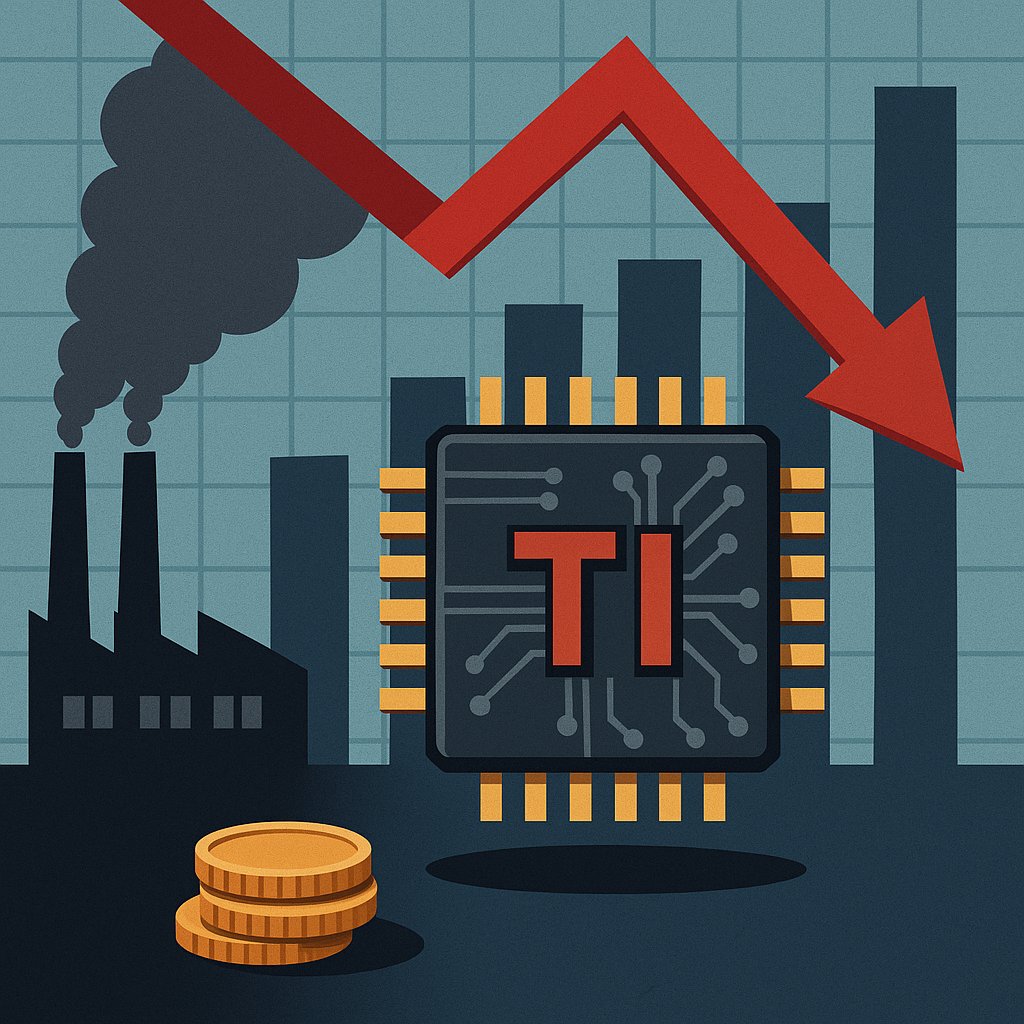A fresh wave of uncertainty has rattled the chip industry after Texas Instruments (TI) slashed its earnings forecast, citing mounting tariff pressures and weakened demand for analog semiconductors. The announcement sent TI shares tumbling nearly 12% in pre-market trading, dragging down peers across the semiconductor landscape and prompting fresh questions about the sector’s short-term resilience.
The news lands at a precarious time for tech investors. After riding the highs of the AI boom, chip stocks are suddenly facing headwinds from global trade disruptions, regulatory risks, and a potential cyclical downturn. Investors now find themselves recalibrating expectations ahead of a dense earnings season that could either validate—or severely challenge—bullish narratives in the sector.
Trade Headwinds Bite into Semiconductor Demand
According to Reuters, Texas Instruments lowered its Q3 revenue guidance by 7.4%, attributing the shortfall to “significant international tariff exposure and downstream inventory corrections.” The company’s analog chips, essential for industrial and automotive applications, are particularly sensitive to global supply chain friction.
What’s particularly concerning is that TI’s customer base spans across multiple verticals, including robotics, power systems, and consumer devices. A drop in its guidance is often viewed as an early warning for broader industry health.
TI CEO Haviv Ilan said in an investor briefing, “We are seeing clear softness in demand, especially out of Asia-Pacific, where regulatory and tariff-related uncertainty has led customers to pause orders and reassess supply chain commitments.”
The Philadelphia Semiconductor Index (SOX) fell 2.3% on the news, while shares of Analog Devices ($ADI), ON Semiconductor ($ON), and NXP Semiconductors ($NXPI) all posted declines between 3% and 6%.
Why This Matters for Investors
For many investors, this forecast cut is more than a company-specific hiccup—it could signal the early stages of an industry-wide correction in a sector that had been flying high on AI momentum and post-COVID restocking demand.
Texas Instruments, known for its historically conservative guidance and tight supply chain discipline, tends to avoid dramatic projections unless internal data strongly supports them. That makes this announcement all the more sobering.
Moreover, with tariffs back in the spotlight amid heightened political tensions with China and new trade pressures from the EU, the semiconductor industry’s global exposure is once again under scrutiny. As tariffs increase costs and reduce visibility, companies that depend on stable trade environments—especially those with high exposure to analog and embedded systems—are likely to see earnings pressure.
Future Trends to Watch
The broader question now is whether this downturn is temporary or structural. While demand for AI‑driven chips remains strong, traditional analog and industrial chips could be in for a prolonged slowdown. Key trends to monitor include:
- Earnings reports from peer firms like Analog Devices (reporting next week), which will offer deeper clarity on whether the weakness is sector-wide.
- U.S.–China trade developments, especially around semiconductor equipment restrictions and advanced chip exports.
- Inventory levels across downstream industries, such as automotive and industrial manufacturing, which may dictate restocking cycles in H2 2025.
There’s also growing speculation that some firms may pivot supply chains to friendlier jurisdictions, adding cost but reducing exposure to political volatility.
Key Investment Insight
Texas Instruments’ earnings miss could signal a broader rotation away from analog chipmakers in the near term. Investors should watch earnings from peer companies closely and consider reallocating toward fabless chip designers, AI-centric semis, or firms with minimal global supply chain risk. While valuation dips could present buying opportunities, especially for long-term believers in semiconductors, near-term caution is warranted until broader earnings clarity emerges.
Stay with MoneyNews.Today for up-to-the-minute analysis and actionable insights on the forces shaping markets, tech, and trade. We break the news that moves your portfolio.





